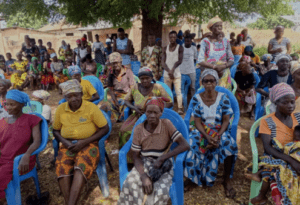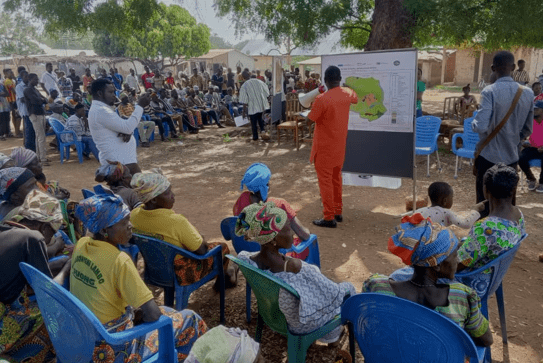By Rafiq Nungor Adam
The Doung and Lawra District and Municipality in the Upper West Region showcase the transformative impact of the European Union Ghana Agriculture Programme (EU GAP), a key initiative to boost agriculture and enhance livelihoods in Northern Ghana.
Through a focus on climate-resilient farming and community-centred planning, EU GAP supports local communities in adapting to environmental challenges, extreme weather, and resource limitation.

“The dam that the EU and GIZ constructed in our community has prevented many of our young boys and girls in Doung from going into illegal mining after the rainy season ends. Also, in the past, whenever it rained, we couldn’t travel to other places because the roads were always flooded. But now, we thank GIZ for constructing farm access roads that have opened up the area, narrated Nabiiribong Albert, the Assemblyman of Doung in the Nadowli-Kaleo District.

Central to EU GAP’s efforts are community demonstration plots, where local farmers in Doung and surrounding areas learn practical techniques for climate-smart agriculture. Annually, 200 demonstration plots are set up to reach smallholder farmers who rely on agriculture for their sustenance.
Thomas Banuor, a farmer in Doung, noted: “We didn’t know some of the techniques they taught us, but now the new methods are helping us. They have shown us how to farm on smaller plots and still get good harvests. They also gave us demonstration farms to learn from. Previously, we planted crops randomly, but now they have taught us to plant in lines to allow air to pass through, which helps during harvesting.”
EU GAP, in partnership with Training and Extension for Conservation Agriculture in the Savannahs (TECAS), also facilitates access to mechanized tools, including ripping services, to support new, sustainable farming practices. To date, this initiative has helped farmers cultivate over 1,126 acres with modern, conservation-focused methods.
In addition to technical support, EU GAP empowers communities to create and implement Community Action Plans (CAPs), addressing each community’s unique needs. CAPs foster inclusive decision-making in land use and prioritize sustainability, promoting long-term environmental stewardship.
The programme also drives innovation in agriculture through the Youth in Agribusiness (YiAB) initiative and the implementation of solar-powered irrigation systems. YiAB equips young people with essential skills in business management, digital marketing, and sustainable practices, positioning them for success in the agribusiness sector. A notable success is Emmanuel Boro Bayi, whose enterprise, “Apex Peanuts,” has expanded its network, sales, and staff following his participation in YiAB.
These impactful projects, funded by the European Union and German development cooperation, exemplify how community-led initiatives can improve livelihoods and build resilient economies. Implemented by Deutsche Gesellschaft für Internationale Zusammenarbeit (GIZ) in collaboration with the Ministry of Food and Agriculture (MoFA), EU GAP demonstrates a scalable approach to strengthening Ghana’s agricultural sector in the face of global environmental challenges.










